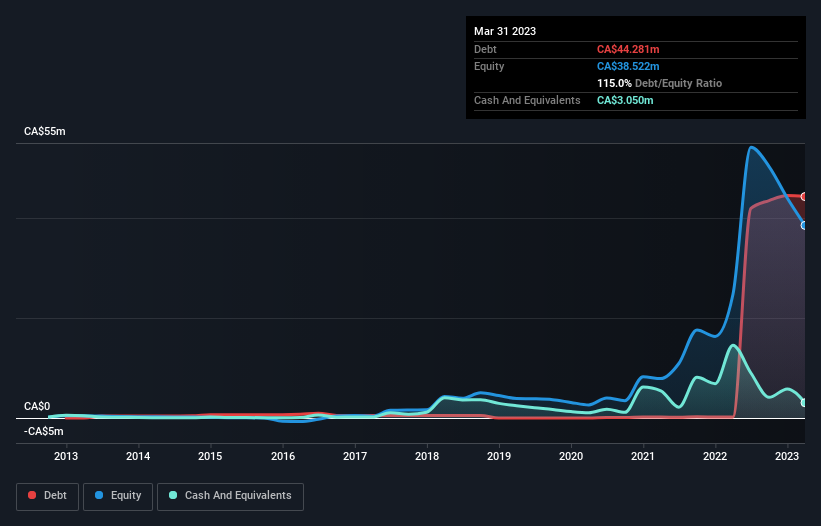Legendary fund manager Li Lu (who Charlie Munger backed) once said, 'The biggest investment risk is not the volatility of prices, but whether you will suffer a permanent loss of capital.' It's only natural to consider a company's balance sheet when you examine how risky it is, since debt is often involved when a business collapses. We note that Deveron Corp. (CVE:FARM) does have debt on its balance sheet. But the real question is whether this debt is making the company risky.
What Risk Does Debt Bring?
Generally speaking, debt only becomes a real problem when a company can't easily pay it off, either by raising capital or with its own cash flow. In the worst case scenario, a company can go bankrupt if it cannot pay its creditors. However, a more frequent (but still costly) occurrence is where a company must issue shares at bargain-basement prices, permanently diluting shareholders, just to shore up its balance sheet. Having said that, the most common situation is where a company manages its debt reasonably well - and to its own advantage. When we think about a company's use of debt, we first look at cash and debt together.
Check out our latest analysis for Deveron
How Much Debt Does Deveron Carry?
You can click the graphic below for the historical numbers, but it shows that as of March 2023 Deveron had CA$44.3m of debt, an increase on CA$205.6k, over one year. However, because it has a cash reserve of CA$3.05m, its net debt is less, at about CA$41.2m.

How Strong Is Deveron's Balance Sheet?
We can see from the most recent balance sheet that Deveron had liabilities of CA$14.8m falling due within a year, and liabilities of CA$55.9m due beyond that. On the other hand, it had cash of CA$3.05m and CA$3.14m worth of receivables due within a year. So its liabilities total CA$64.5m more than the combination of its cash and short-term receivables.
When you consider that this deficiency exceeds the company's CA$54.7m market capitalization, you might well be inclined to review the balance sheet intently. In the scenario where the company had to clean up its balance sheet quickly, it seems likely shareholders would suffer extensive dilution. When analysing debt levels, the balance sheet is the obvious place to start. But it is future earnings, more than anything, that will determine Deveron's ability to maintain a healthy balance sheet going forward. So if you want to see what the professionals think, you might find this free report on analyst profit forecasts to be interesting.
In the last year Deveron wasn't profitable at an EBIT level, but managed to grow its revenue by 252%, to CA$33m. When it comes to revenue growth, that's like nailing the game winning 3-pointer!
Caveat Emptor
Despite the top line growth, Deveron still had an earnings before interest and tax (EBIT) loss over the last year. Indeed, it lost a very considerable CA$9.6m at the EBIT level. When we look at that alongside the significant liabilities, we're not particularly confident about the company. We'd want to see some strong near-term improvements before getting too interested in the stock. Not least because it had negative free cash flow of CA$14m over the last twelve months. That means it's on the risky side of things. When analysing debt levels, the balance sheet is the obvious place to start. But ultimately, every company can contain risks that exist outside of the balance sheet. Be aware that Deveron is showing 4 warning signs in our investment analysis , and 1 of those is concerning...
When all is said and done, sometimes its easier to focus on companies that don't even need debt. Readers can access a list of growth stocks with zero net debt 100% free, right now.
New: Manage All Your Stock Portfolios in One Place
We've created the ultimate portfolio companion for stock investors, and it's free.
• Connect an unlimited number of Portfolios and see your total in one currency
• Be alerted to new Warning Signs or Risks via email or mobile
• Track the Fair Value of your stocks
Have feedback on this article? Concerned about the content? Get in touch with us directly. Alternatively, email editorial-team (at) simplywallst.com.
This article by Simply Wall St is general in nature. We provide commentary based on historical data and analyst forecasts only using an unbiased methodology and our articles are not intended to be financial advice. It does not constitute a recommendation to buy or sell any stock, and does not take account of your objectives, or your financial situation. We aim to bring you long-term focused analysis driven by fundamental data. Note that our analysis may not factor in the latest price-sensitive company announcements or qualitative material. Simply Wall St has no position in any stocks mentioned.
About TSXV:FARM
Deveron
Provides data collection and analytics services to the agricultural industry in Canada and the United States.
Moderate and good value.
Similar Companies
Market Insights
Community Narratives


